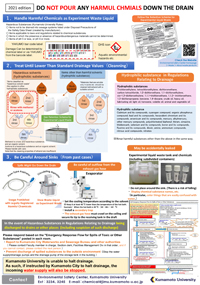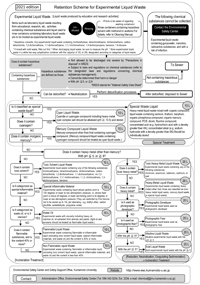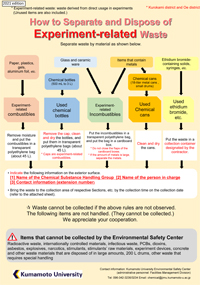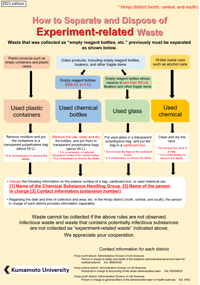Waste
About waste products
The research and medical care activities conducted at Kumamoto University produce many waste products. Much of them can be divided into two major categories of general waste and industrial waste. Of these, industrial waste includes special chemicals that are particularly harmful. The Environmental Safety Center collects and disposes of waste materials produced by research as experimental waste.
Waste containing chemicals is handled separately as chemical waste.
Waste (containing chemical substances)
This section explains the general methods for reusing and recycling waste.
-
Retention Scheme for Experimental Liquid Waste

-
Guidelines for Drainage

Basic matters related to waste disposal at Kumamoto University
- Sorting waste materials
-
- 1. Sorting of waste materials at Kumamoto University will be carried out based on the Sorting and Collecting: How to Separate Trash and How it is Collected Guidebook (determined by the Environmental Committee on September 24, 2009) and the Kumamoto University Waste Sorting Categories Appendix.
- Storage
-
- 2. The storing of Kumamoto University waste shall be managed by the department so as not to interfere with the environment, safety, or hygiene.
- Collection, transportation and disposal
-
- 3. The collection, transportation, and disposal of Kumamoto University waste shall be entrusted by the department to a general waste disposal contractor or an industrial waste disposal contractor. However, the collection, transportation, and disposal of combustibles, incombustible materials, bottles, steel cans, aluminum cans, PET bottles and metals will be commissioned by the university (excluding affiliated hospitals) to be handled by a general waste disposal contractor. Also, collection, transportation, and disposal of waste-such as fluorescent tubes, batteries, lead-acid batteries, dangerous bio-materials, hazardous sludge, equipment containing mercury, and chemicals-will be commissioned by the Environmental Safety Center to be handled by an industrial waste disposal company.
- 4. When commissioning the collection, transportation, or disposal of waste to a general waste disposal contractor or an industrial waste disposal contractor, the person in charge of the commission contract must confirm the various processes involved.
- 5. The person in charge of the commission contract must calculate the emissions for each type of waste.
- Miscellaneous
-
- 6. If review of these processes are necessary, such will be decided by the Facilities and Environmental Committee
Nov. 30, 2011 - Approved by agreement of the Facilities and Environmental Committee
-
How to Separate and Dispose of Experiment-related Waste(Kurokami and Oe)

-
How to Separate and Dispose of Experiment-related Waste(Honjo)














